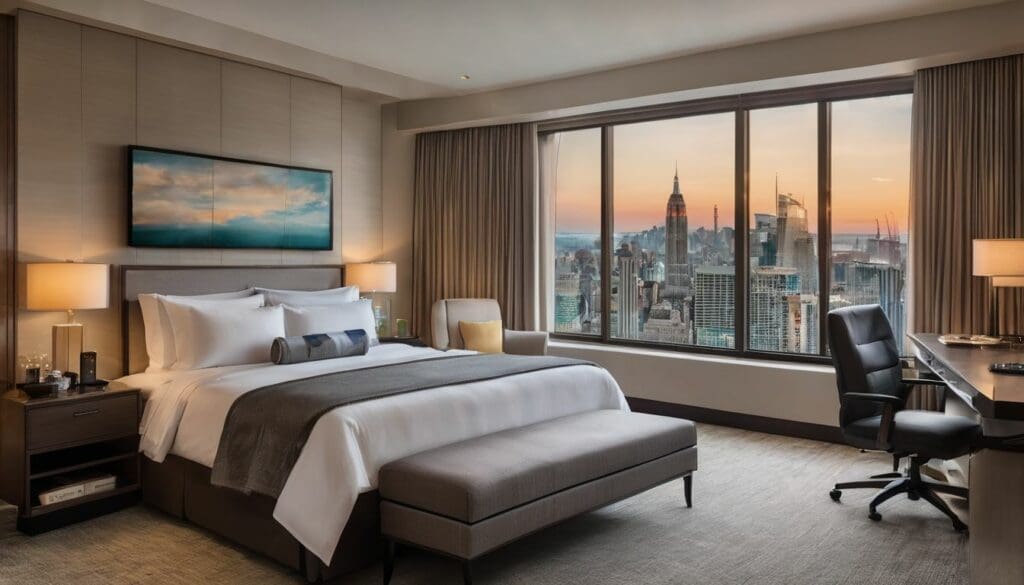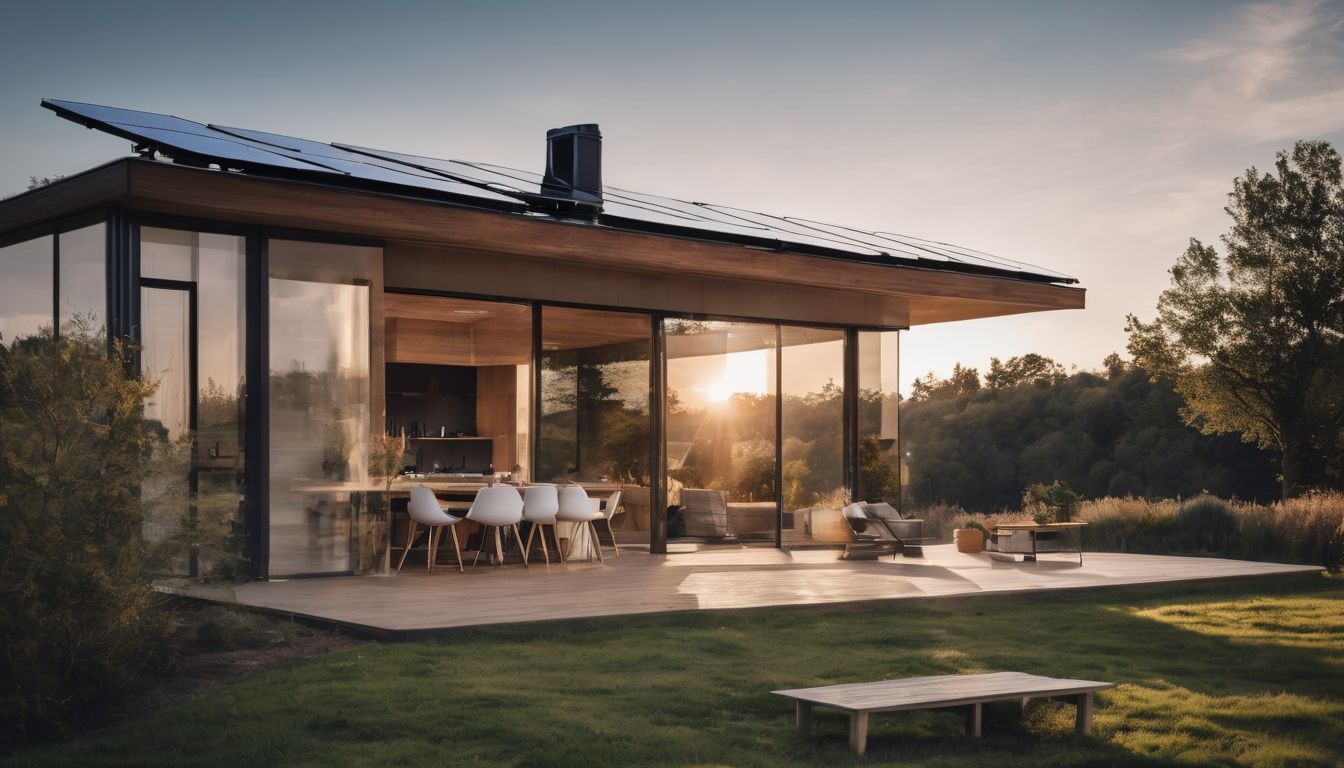 Rising energy bills are a challenge for any hotel manager. Hotels consume significant power daily, mostly unnecessary. This article lays out practical tips to slash your hotel’s energy use and costs.
Rising energy bills are a challenge for any hotel manager. Hotels consume significant power daily, mostly unnecessary. This article lays out practical tips to slash your hotel’s energy use and costs.
Discover smart savings ahead!
Key Takeaways
- Establish set heating and cooling limits in hotel rooms to control energy usage, preventing waste and saving costs.
- Upgrade outdated appliances with energy – efficient models, such as HVAC systems and LED lighting, to lower electricity consumption.
- Install smart technology like occupancy sensors and automatic shutdown sockets for lights and devices to cut down on power use when areas are unoccupied.
- Consider renewable energy sources like solar panels to generate clean power and reduce reliance on non-renewable utilities.
- Regularly monitor and evaluate your hotel’s energy management plan, involving staff feedback for continuous improvement towards sustainability.
Importance of Energy Efficiency in the Hospitality Industry
Energy efficiency in the hospitality industry serves as a cornerstone for sustainable hotel operations. Hotels demand constant power for lighting, heating, and cooling systems, which can lead to high energy consumption if not managed properly.
By adopting energy-efficient solutions and eco-friendly practices, hotels can significantly reduce their environmental impact while also cutting down on costs. Sustainable energy practices help in conserving valuable resources and contribute positively to combating climate change.
Hotels that prioritise energy conservation often find these methods can actually enhance guest comfort whilst showcasing a commitment to sustainability. Guests today increasingly prefer eco-conscious establishments that align with their own values of protecting the environment.
An investment in energy efficiency sends a strong message about a hotel’s dedication to future-proofing its business and the planet alike. Such measures include installing occupancy sensors, upgrading to low-energy appliances, or implementing smart thermostats – all steps towards responsible stewardship of our shared resources.
Moving beyond the immediate benefits of cost savings and environmental conservation leads us into exploring specific tips for reducing energy consumption within hotel premises.
[Next sub-heading: Tips for Reducing Energy Consumption and Costs in Hotels]
Tips for Reducing Energy Consumption and Costs in Hotels
Set heating and cooling limits to avoid excessive energy usage. Upgrade to energy-efficient equipment and utilise smart lighting technology for cost-effective energy consumption. Consider implementing solar panel technology and automatic shutdown sockets for further savings.
https://www.youtube.com/watch?v=JKS7_YuWhzE
Set heating and cooling limits
To reduce energy consumption and costs in hotels, establish set heating and cooling limits. This prevents unnecessary energy use during off-peak times, saving money and reducing environmental impact by conserving energy.
By implementing these measures, hotels can adopt a more sustainable approach to their energy usage while significantly lowering operational costs.
Adjusting heating and cooling systems based on occupancy levels or seasonal changes helps prevent overuse of energy resources. Limiting the temperature range ensures a comfortable environment for guests while promoting responsible energy management within the hotel industry.
Monitor heating and hot water usage
Monitoring heating and hot water usage is essential for maximising energy efficiency in hotels. Regularly checking the temperature settings and usage patterns can help identify opportunities to reduce energy consumption without sacrificing guest comfort.
By analysing data on heating and hot water usage, hotel managers can pinpoint potential areas for improvement, adjust settings accordingly, and implement targeted strategies to lower energy costs.
This proactive approach not only reduces environmental impact but also contributes to significant cost savings over time, aligning with sustainable energy practices for hotels.
Upgrade to energy-efficient equipment
When considering ways to reduce energy consumption and costs in hotels, upgrading to energy-efficient equipment is a crucial step. By replacing outdated appliances with modern, eco-friendly alternatives, hotels can significantly decrease their energy usage and ultimately save on costs.
Upgrading to energy-efficient HVAC systems, refrigeration units, and water heaters ensures that the hotel operates optimally while reducing its environmental impact. With sustainable practices like this, hotel managers can effectively contribute to conservation efforts and promote eco-consciousness within the hospitality industry.
Utilise smart lighting technology
Implement smart lighting technology to reduce energy consumption and costs in hotels. Adjust lighting levels based on natural light to minimise electricity usage. Install motion sensor lights in common areas to automatically switch off when not in use, saving energy.
Retrofitting existing fixtures with LED bulbs can also significantly lower energy usage while providing quality illumination for guests and staff. This cost-effective measure aligns with sustainable practices, contributing to the conservation of energy in the hotel industry.
Optimise your hotel’s energy efficiency by integrating smart lighting solutions throughout the property, reducing environmental impact and operational expenses simultaneously.
Implement solar panel technology
By utilising smart lighting technology in hotels, energy consumption can be significantly reduced. Solar panel technology offers another opportunity to further enhance energy efficiency and decrease reliance on traditional power sources.
Installing solar panels enables hotels to harness renewable energy from the sun, reducing their carbon footprint while also cutting down on electricity costs.
Hotels embracing solar panel technology actively contribute to sustainable practices within the hospitality industry. This eco-friendly approach aligns with environmentally conscious values and demonstrates a commitment to reducing the environmental impact of hotel operations.
Use automatic shutdown sockets
Install automatic shutdown sockets in hotel rooms to efficiently manage energy usage. These smart devices can detect when a guest leaves the room and automatically switch off non-essential electrical appliances, helping to reduce unnecessary energy consumption.
By integrating these sockets into your hotel’s energy management strategy, you can contribute to sustainable practices for reducing energy costs and minimising environmental impact.
Implementing automatic shutdown sockets aligns with eco-friendly initiatives and promotes conservation measures within the hospitality sector. This simple but effective technology not only saves on utility bills but also demonstrates a commitment to environmentally friendly practices, appealing to guests who are increasingly conscious of sustainable accommodation options.
Creating an Efficient Energy Management Plan for Hotels
Examine current energy usage, analyse billing trends, gather information from staff, and organise and monitor progress to create an efficient energy management plan for hotels. If you want to learn more about sustainable practices and cost-effective measures for the hospitality industry, keep reading!
Examine current energy usage
To improve energy efficiency, it’s crucial to examine current energy usage within the hotel. This involves tracking electricity, gas, and water consumption across different areas of the establishment.
By assessing where the most energy is being used, hotel managers can identify opportunities for reduction and implement targeted solutions that align with sustainability goals. In addition, analysing peak usage times can help in adjusting operational schedules to minimise unnecessary energy expenditure.
Moving forward to “Analyse billing trends“, understanding how periods of high energy use correlate with billing cycles will lead to more informed decision-making and cost-effective measures for reducing overall consumption without compromising guest satisfaction or comfort levels.
Analyse billing trends
Analyse billing trends to identify peak energy usage periods, helping to pinpoint areas for potential cost savings. By closely examining billing data, hotel managers can uncover patterns in energy consumption and take strategic action to reduce costs.
Understanding when energy is most used allows for targeted efficiency improvements in the hospitality sector.
Gathering insights from billing trends empowers hoteliers to make informed decisions about energy management strategies and sustainable practices. With this information, hotels can implement measures that align with their eco-conscious goals, leading to improved sustainability while also reducing operational expenses.
Gather information from staff
Obtain input from your team to identify areas for improvement and energy-saving opportunities. Engage with staff members to gather insights on current practices, challenges, and potential solutions.
Encourage open communication to harness the collective knowledge and experience of your employees in implementing cost-effective measures for sustainable energy usage within your hotel.
Engage with your team to get valuable input on current processes, challenges, and potential solutions. Encouraging open communication fosters a collaborative approach towards implementing eco-friendly strategies effectively across all operations.
Organise and monitor progress
To improve energy efficiency, hotel managers can organise and monitor progress by examining current energy usage, analysing billing trends, and gathering information from staff. By doing so, they can identify areas for improvement and track the effectiveness of their energy-saving measures using cost-effective energysaving methods.
Regular assessments help in adopting sustainable practices for energy usage in hotels while making eco-conscious decisions that align with environmentally friendly tips for the hotel industry.
Included within this plan is a focus on creating an efficient energy management strategy to ensure that hotels are continuously improving their sustainability practices.
Why Choose Shipley Energy as an Energy Partner?
With a wide range of energy services and solutions, Shipley Energy is the perfect partner for hotels looking to improve their energy efficiency. Our customer testimonials speak volumes about our commitment to providing cost-effective and sustainable energy options for the hospitality industry.
Customer testimonials
- “Shipley Energy’s energy – saving solutions have made a significant impact on our hotel’s environmental footprint, allowing us to save costs without compromising on guest comfort.”
- “The expertise and guidance provided by Shipley Energy have empowered us to implement sustainable energy practices in our hotel, aligning with our environmental values.”
- Shipley Energy’s commitment to sustainability and eco – friendly solutions has been instrumental in helping our hotel reduce energy consumption and operating costs.
- The comprehensive range of services offered by Shipley Energy enables hotels to implement tailored energy-efficient strategies, contributing towards a more sustainable future.
- With Shipley Energy as an energy partner, hotels can access renewable energy options that align with their green initiatives, strengthening their position as environmentally conscious businesses.
- Contact Shipley Energy today to learn how you can enhance your hotel’s energy efficiency while supporting conservation and environmental sustainability.
Wide range of services
Choose Shipley Energy for a wide array of energy services, including efficient solutions to meet your hotel’s specific needs. Benefit from renewable energy options, eco-conscious practices, and cost-effective measures tailored to the hospitality sector.
With a focus on sustainability and conservation methods, Shipley Energy offers an extensive range of services for environmentally conscious individuals seeking to improve energy efficiency in their hotels.
Contact information
For more information on how Shipley Energy can help your hotel reduce energy consumption and costs, as well as implement eco-friendly practices, visit our website or contact us directly.
Our team of experts can provide a wide range of services tailored to the specific needs of your hospitality business. Whether you are looking for cost-effective energy-saving measures, sustainable energy tips, or renewable energy options for hotels, we have the expertise and resources to support your environmental conservation efforts.
By choosing Shipley Energy as your energy partner, you can take meaningful steps towards improving energy efficiency in the hospitality sector while reducing your environmental impact.
Get in touch with us today to learn more about our green initiatives and how we can help your hotel become more eco-conscious and sustainable in its operations.
Conclusion
In conclusion, implementing energy-saving measures in the hospitality industry is crucial for reducing costs and contributing to environmental conservation. Hotel managers can make a significant impact by setting heating and cooling limits, upgrading to energy-efficient equipment, and utilising smart lighting technology.
Creating an efficient energy management plan is essential for monitoring progress and ensuring sustainable practices are maintained. With these strategies in place, hotels can lead the way in eco-friendly initiatives while also benefiting from reduced energy expenses.
FAQs
1. What are some cost-effective energy-saving measures for hotels?
Hotels can adopt eco-friendly practices like using energy-efficient lighting, managing heating and cooling systems smartly, and investing in green initiatives to cut down on power usage.
2. How can hotel managers reduce energy consumption?
Hotel managers can implement strategies such as monitoring energy usage, upgrading to sustainable technologies, and training staff on conservation methods to effectively lower their establishment’s energy consumption.
3. Are there ways for resorts to both save money and be eco-friendly?
Resorts can save money by employing eco-conscious practices such as installing solar panels or opting for water-saving fixtures, combining sustainability with cost efficiency.
4. Can you give tips on how the hospitality sector might conserve energy?
The hospitality sector can engage in techniques that involve regular maintenance of equipment, insulating buildings properly, and using natural light whenever possible to conserve energy.
5. Why should the hospitality industry consider sustainability practices?
Sustainability practices not only lead to a significant reduction in utility costs but also attract environmentally conscious guests who prefer eco-friendly strategies when choosing their lodging.





